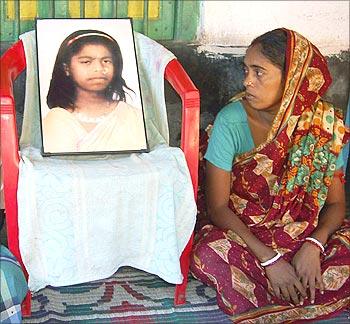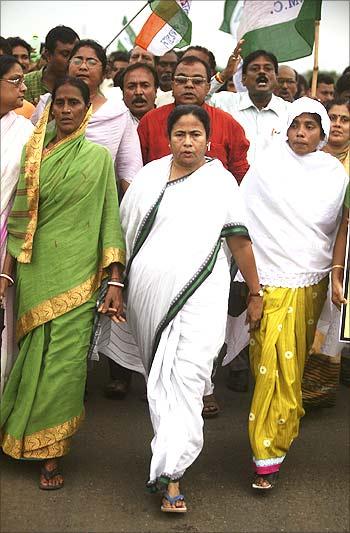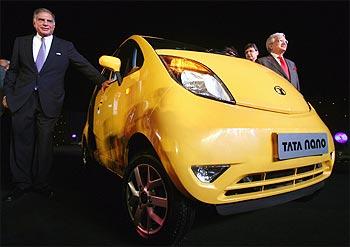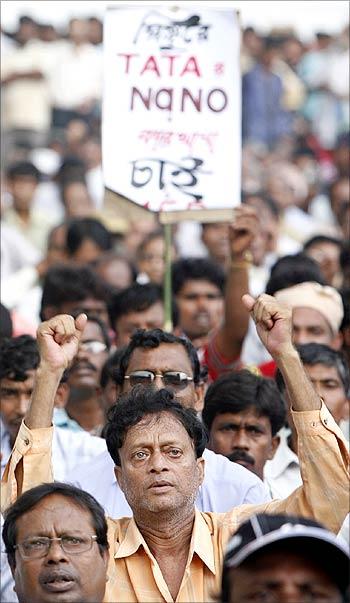Photographs: Reuters
With any industry yet to come up at the abandoned site of Tata's Nano car project at Singur, most of the landowners who had willingly parted with their fields are now back to what they had been doing: cultivation.
For a long time, the landowners had held back switching to their age-old occupation hoping that something positive would turn out after the dramatic October 2, 2008 announcement of Nano's pullout by Tata Group chairman Ratan Tata.
After the Tatas drove away their Nano to Sanand in Gujarat, the government tried to keep back the ancillary units that had come up adjacent to the project site. But once they realised that they would be starved of orders, they left. . . .
What the Singur landowners are doing now
Image: Railway Minister Mamata Banerjee.Photographs: Jayanta Shaw/Reuters
Then came the state government's aborted initiative to set up a unit of the BHEL -- either a power equipment manufacturing unit or a 1600 MW power generation unit -- jointly with the West Bengal Power Development Corporation.
On November 12, 2008, BHEL officials had undertaken a survey of the area. However, land was found unfit for the purpose.
Railway Minister Mamata Banerjee then broached a proposal to set up a rail coach factory in the 'undisputed' 600 acres of the total 997 acres, provided the Tatas returned the land leased out to them. She, however, insisted the land had to be dispute free.
We cannot wait for eternity. There is an end even to hoping against hope," Bikash Pakira, a marginal landowner of Joymollah village in the Singur bloc, told PTI.
What the Singur landowners are doing now
Image: Tata Motors chairman Ratan Tata (left) poses with Nano car.Photographs: Punit Paranjpe/Reuters
When the project was on, many of the willing land-givers had received industrial training hoping for absorption in the Nano project as promised by the Tatas. He had received technical training at the Ramkrishna Mission Shilpa Mandir, an industrial training institute at Belur in Howrah district.
Working for sometime as a day labourer, he now tills a small piece of land not very far from the abandoned car project site. The land was purchased by his family with the money he received as compensation for giving away land from the West Bengal government.
"We had one bigha land. After announcement of the Tata project, we willingly gave away our land receiving cheques as compensation. I will never repeat the mistake," Bikash said. Bikash's fate seems way better compared to that of Pintu Saha, son of a willing land-giver, of Berabari village in Singur.
Pintu, who had received six-month technical training from an institute in Pune and joined the engine shop at the Nano factory, is now an agricultural day labourer. "I perhaps hoped for too much," he said with a wry smile.
Ratan Ghosh, a peasant landowner of Gopalnagar village, who had refused to accept the compensation cheque from the government, is now desperate for a job - any job - to support his family and urged Banerjee to do something.
"We did not accept the cheque because we had no other occupation to engage in. We are facing tremendous trouble in running the family. Mamata should come forward for a solution. We still depend on her," he said.
What the Singur landowners are doing now
Image: Left Front supporters gather in support of the Tata car project at Singur.Photographs: Parth Sanyal/Reuters
Now that Banerjee's initiative to set up a rail coach factory at the 'undisputed' 600 acres of the total 997 acres has rekindled renewed interest, those whose land are within the area are hopeful of something positive turning out.
However, people like Mahadeb Das of Joymollah village, who had steadfastly backed the Trinamool chief against the Tata project, are sceptical. "We want to ask Didi what will happen to us who refused to accept cheques?'' he said.
The reality, however, is that the 600 acres, where the coach factory is supposed to come up, includes land of both the unwilling and willing land-givers.





article